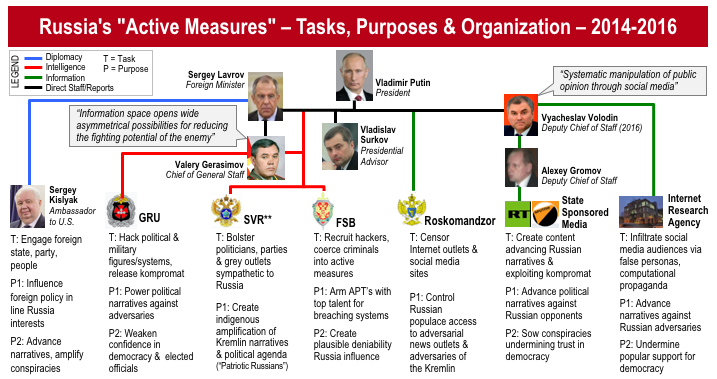In today's #vatniksoup, I'll discuss Russian online information operations, and how they are perceived around the world. In the West, we often perceive this propaganda only targeted at us, which is far from the truth.
1/17
1/17

As I've written previously, the idea of Russian information operations date back to days of KGB, and it is part of the, aktivnye meropriyatiya, or active measures. Active measures includes activities like espionage, propaganda, sabotage and assassination, and it is ...
2/17
2/17

...and was part of Russia's foreign policy. Another related term related to info ops is hybrid warfare, which is a theory of military strategy that blends conventional warfare with irregular warfare, cyberwarfare and warfare in the information space.
3/17
3/17

It is worth noting that information operations are most often long-term operations, with goals far ahead in the future. KGB defector Yuri Bezmenov stated that most operations have a time span of around 25 years.
4/17
4/17
The general, simplified model for info ops is as follows: first, you sow fears ("Ukrainians are killing Russians"). Then you fuel mistrust ("You can't trust the mainstream media, they're CIA/MI6/deep state/etc controlled"), ...
5/17
5/17

...and finally you offer salvation ("here's an interesting blog/group that tells you the TRUTH").
The war waged in information space is just as important as the conventional war in the battlefield - when combined with other measures, effective online info ops can heavily..
6/17
The war waged in information space is just as important as the conventional war in the battlefield - when combined with other measures, effective online info ops can heavily..
6/17

...affect people's opinions. For example, pro-Russian propagandists often refer to the Russo-Ukrainian War as a "waste of money". They can also refer to the high levels of corruption in Ukraine, which is mostly a legacy and tradition from the Soviet times, or refer to...
7/17

7/17


...its leadership ("the Kyiv regime") as being greedy and corrupt group of warmongers.
One of the best-known propagandists of the modern era, Joseph Goebbels, laid out various principles on successful propaganda, and these principles are still utilized today.
8/17
One of the best-known propagandists of the modern era, Joseph Goebbels, laid out various principles on successful propaganda, and these principles are still utilized today.
8/17

One of his principles was "Pick out one special 'enemy' for special vilification." In the case of Ukraine, this enemy is the "Kyiv regime" and their armed forces that is "infiltrated by neo-Nazis" that are a threat to both Ukrainians and the Russians.
9/17
9/17

Another one of Goebbels' principles was "Avoid abstract ideas - appeal to the emotions" - bioweapons labs, "neo-Nazis", NATO proxy war, genocide of Russian population in Ukraine... all these are tangible, simple ideas that can easily be reinforced with propaganda.
10/17

10/17


This reinforcing is done in line with another of Goebbels' principles, "constantly repeat just a few ideas". When we look at the Russian propaganda model in regards to Ukraine, we can see that Goebbels' last two principles are applied, too: the first one is "give only ...
11/17
11/17

...one side of the argument", and "continuously criticize your opponents".
The most successful case of hybrid warfare were the Russian interference of 2016 US presidential election and the Brexit referendum. These operations was started almost a decade before the ...
12/17
The most successful case of hybrid warfare were the Russian interference of 2016 US presidential election and the Brexit referendum. These operations was started almost a decade before the ...
12/17

...actual events, and they contained operations such as hack-and-leak, mass spreading of online disinformation and propaganda, funding of (opposing) NGO's, and undermining of the authorities, journalists and official institutions.
13/17

13/17


All online operations were naturally supported with heavy use of troll farms and social media manipulation through organizations like Yevgeny Prigozhin's Internet Research Agency.
14/17
14/17

But now that we know all this, we can counter it, right? Yes and no. The Kremlin propagandists have realized long time ago that the West has become more resilient against their BS, and so they've focused on new areas such as the Global South.
15/17
15/17

For example, RT is one of the most popular sources for the Russo-Ukrainian War in Latin America. RT recently made partnership with Cameroonian TV channel, Afrique Média. An animation where Wagner soldier defeats "French zombie invaders" goes viral on African social media.
16/17


16/17



In Mali you can listen to news on Sputnik Afrique every night. The leaked US intelligence documents revealed that Russia is planning a propaganda campaign to "realign" public opinion in Africa towards Russia & so far almost nobody in the West has paid any attention to this.
17/17

17/17


Support my work: buymeacoffee.com/PKallioniemi
Past soups: vatniksoup.com
Related soups:
Russian narratives:
Social media manipulation:
Troll farms:
Past soups: vatniksoup.com
Related soups:
Russian narratives:
https://twitter.com/P_Kallioniemi/status/1634168118992949251
Social media manipulation:
https://twitter.com/P_Kallioniemi/status/1605106747575771138
Troll farms:
https://twitter.com/P_Kallioniemi/status/1601115023589658624
• • •
Missing some Tweet in this thread? You can try to
force a refresh

































